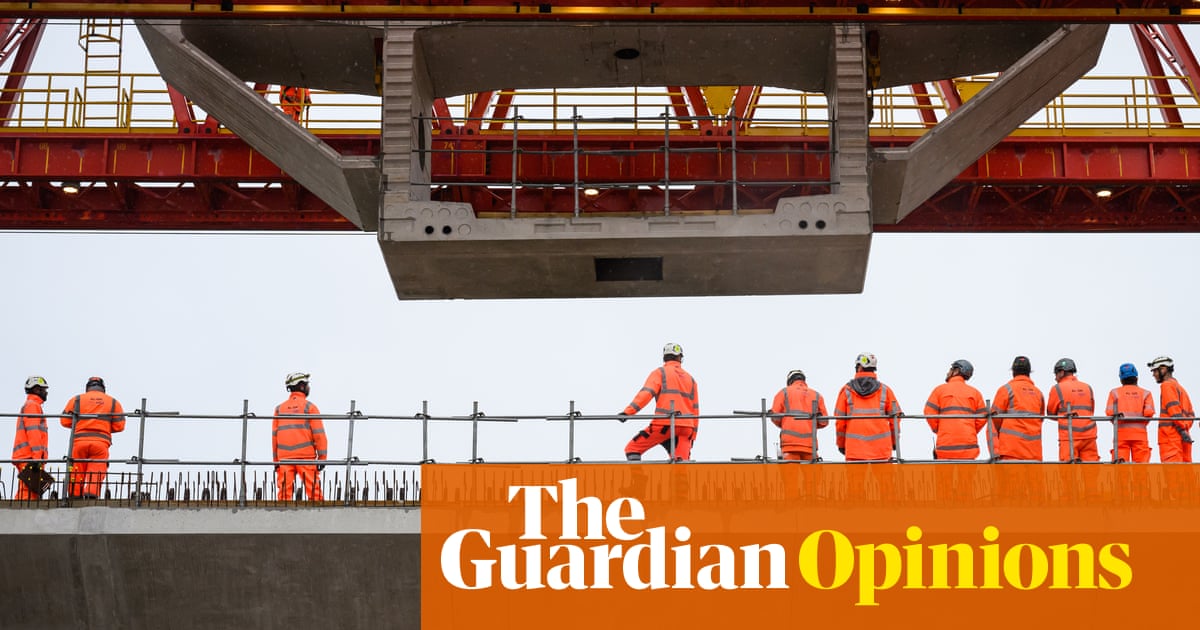Where was the elephant in the room? It received not a mention in the spending review. In among the hospitals and schools, the highways and the prisons, the great beast wandered, a ghostly presence cursing all from whom it stole.
I found it in a Whitehall handout, sandwiched somewhere between Leeds station and a Welsh level crossing. The transport department did not even include it in its railway plans for the parliament. It was relegated, as if an extinct species, to just one short sentence. It said it would spend£25.3bn “to address longstanding delivery challenges”for HS2. Is it a train or not a train?
This means that over the remainder of this parliament, Rachel Reeves’s Treasury intends for HS2 to consume between a fifth and a quarter of the government’sentire investment budget of £113bn. Yet this staggering fact was not so much as murmured in the Commons or in any subsequent media comment.
There was certainly no mention of the project’s constantlysoaring coston completion in the mid-2030s. According to the lastpublic accounts committee report, even the slimmed down railway has raced to more than £80bn and is usually said to be approaching £100bn. Reeves’s extravagant nuclear reactors will cost farless than thatand she was happy to boast of them.
Because few can easily distinguish billions from millions, let us look at the comparisons. Reeves now wants to build a railway from Birmingham to Euston at a price that is more than doublethe £39bn that she wants to spendover the same decade, 2025-2035, on social housing. Over the course of this parliament, the £25.3bn extra that Reeves will spend on HS2 is significantly more than the outlay on prisons and new classrooms.
So by the next election,HS2will have received £25.3bn, while two east-west railways, in the Midlands and the north, will have received £6bn between them and poor Wales just £300m. These projects got a mention, but why not HS2? Is it perhaps because Reeves is ashamed? She knows that HS2 will principally benefit commuters into London. London always wins the vanity projects.
At first HS2 was built to be high-speed – requiring wide tunnels and pathways – and then reduced in speed but not in cost. Then it was said to be about capacity not speed, but this did not appear to lessen the cost. Then it was cut from 11 platforms to seven at Euston. This was a really stupid train.
The project soon lost any serious supporters outside railway addicts and political cheerleaders. In 2021, after Rishi Sunak as chancellorcancelled the Leeds extension, the government’s infrastructure projects authority gave HS2 a“red rating”, which bluntly meant “delivery of the project appears unachievable”. The Commons public account committee said that “value for money was at risk”. Then in 2023, Sunak as prime ministercancelled the second northern leg, to Manchester. This stripped the project of all “levelling up” value.
The most hair-raising Common minutes I know are those of thepublic account committee’s inquiryinto HS2 last December. They read like a banana republic at work. The company’s umpteenth chief executive, Mark Wild, was just 17 days into his job, presumably on something likehis predecessor’s £650,000. Forty-three HS2 staff were identified asearning more than £150,000a year. Meanwhile, whistleblowers alleged that costs forecasts were being manipulated to secure funding. One of them was last weekpaid more than £300,000compensation after being excluded from two roles as a result of his whistleblowing.
The PAC chair, Geoffrey Clifton-Brown,said that HS2is “a cautionary tale ... in how not to run a major project” and that Department for Transport mismanagement is “likely to have wasted billions of pounds of taxpayers money in delay and overspends.” Yet with 33,000 staff employed and 2,000 sub-contractors and consultants having already worked their way through tens of billions at current prices, HS2 clearly knew how to relieve the taxpayers of cash. It tried to claim that, unlike schools or hospitals, it was due its money “under contract”. The PAC caved in. It merely suggested the HS2 team perform a “reset”. This week the reset took the predictable form of a demand for more money. The Treasury caved in too.
The final fiasco surrounds the funding of HS2’s destination. This is planned to be Old Oak Common in Acton, due to be completed between 2029 and 2033. The supposed extension to Euston is now not envisageduntil 2038, which in public investment is close to never. Work at Euston has stopped, leaving a reported400 families evictedfrom their homes and 25 hectares of dirt. This is in Starmer’s constituency.
Sunak said Euston would one day be rebuilt “by the private sector”, possibly implying a Canary Wharf style cluster of skyscrapers overlooking Regent’s Park. Even that outrage would not realise the necessary£6bn – if not £10bn. The new Euston would merely send a handful of trains an hour to a less convenient Birmingham station than the old one. With rail travel still not back at pre-pandemic levels, Euston needs not another train but a politician with guts.
The whole of Whitehall now knows HS2 makes no sense. At times like this, parliament is hopeless. Most MPs, at some time in the past, voted for its various mistakes and hate changing their minds. HS2 is the Iraq war of Treasury spending. Starmer should surely know that, on the day he took office, he should have done what Chris Christie of New Jersey did. The governor simply told the contractors of two massive Hudson River tunnels topack up and go home.
Starmer could still kill it, recouping some billions from selling HS2 land. At the same time, Reeves could have gone wild. She could have doubled the number of projects she listed this week. Hospitals could have soared in number, schools multiplied, prisons renewed. I cannot believe Reeves really thinks Britain needs them less than it needs a new railway to Birmingham. As it was, she flunked it. She took a weak decision, and could not even bring herself to mention it.
Simon Jenkins is a Guardian columnist
